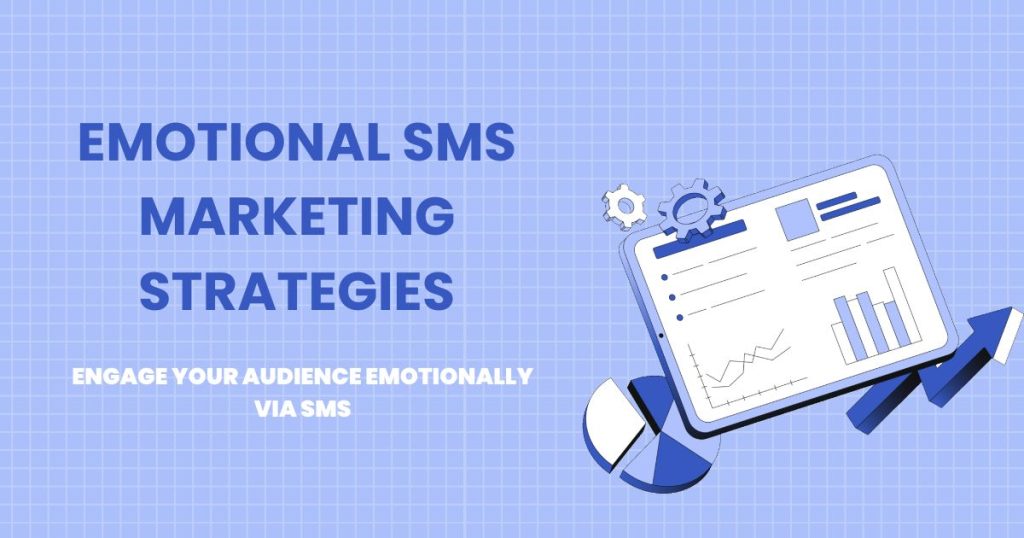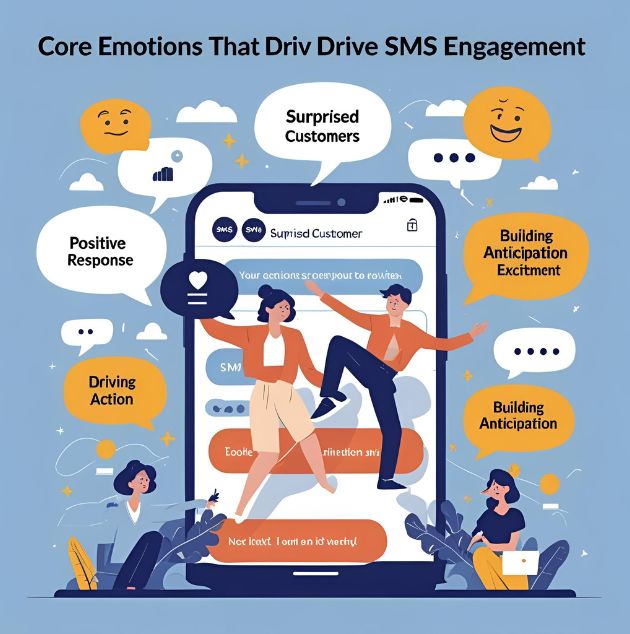How SMS Marketing Can Connect Emotionally

SMS marketing has evolved far beyond simple promotional messages and discount codes. While traditional text campaigns focus on transactions, emotive SMS marketing taps into something deeper—human emotions and genuine connections. This approach transforms brief 160-character messages into powerful tools that build lasting relationships with customers.
Understanding how to craft emotionally resonant text messages can dramatically improve your marketing results. When customers feel genuinely connected to your brand through thoughtful messaging, they’re more likely to engage, purchase, and remain loyal over time. This comprehensive guide explores how to harness emotions in your SMS campaigns, create meaningful connections, and drive better business outcomes through strategic emotional messaging.
The psychology behind emotive messaging runs deeper than most marketers realize. Every text message carries emotional weight, whether intentional or not. By learning to leverage this power strategically, you can transform routine communications into memorable brand experiences that customers actually appreciate receiving.
Understanding Emotive SMS Marketing
Emotive SMS marketing goes beyond product features and price points to connect with customers on an emotional level. This strategy recognizes that purchasing decisions are often driven by feelings rather than pure logic. When brands successfully tap into emotions like joy, excitement, nostalgia, or even urgency, they create stronger bonds with their audience.
Traditional SMS campaigns typically focus on immediate conversions through promotional offers. While these messages can drive short-term sales, they often fail to build lasting customer relationships. Emotive messaging, however, prioritizes connection over conversion, leading to higher customer lifetime value and brand loyalty.
The key difference lies in intention. Standard marketing texts view customers as transaction opportunities. Emotive SMS marketing sees them as real people with feelings, desires, and personal stories worth acknowledging. This shift in perspective fundamentally changes how you craft messages and measure success.

The Psychology Behind Emotional Messaging
Human brains are wired to respond to emotional stimuli more strongly than rational arguments. When customers receive a text message that resonates emotionally, their brains release chemicals like dopamine and oxytocin, creating positive associations with your brand. These neurological responses influence future purchasing decisions and brand perception.
Emotions also improve message retention. Customers are more likely to remember texts that made them feel something specific. A promotional message might be forgotten within minutes, but an emotionally engaging message can stick in memory for days or weeks, increasing the chances of future engagement.
Trust builds through emotional connection. When customers feel that a brand understands and cares about them as individuals, they develop stronger loyalty. This emotional bond becomes a competitive advantage that’s difficult for rivals to replicate through price cuts or feature improvements alone.
Core Emotions That Drive SMS Engagement
Different emotions serve different purposes in SMS marketing campaigns. Understanding when and how to evoke specific feelings helps you craft more effective messages for various situations and customer segments.

Joy and Excitement
Messages that spark joy create positive brand associations and encourage sharing. Celebration texts for birthdays, anniversaries, or personal milestones make customers feel special and valued. Excitement-building messages around new product launches or exclusive events generate anticipation and buzz.
Examples of joy-driven messages include surprise rewards, congratulations on achievements, or playful content that brings a smile. These texts work particularly well for lifestyle brands, entertainment companies, and businesses with younger demographics who appreciate fun, lighthearted communication.
Trust and Security
Building trust through SMS requires consistent, reliable messaging that demonstrates care for customer wellbeing. Security-focused emotions work especially well for financial services, healthcare providers, and subscription services where customers need reassurance about their choices.
Trust-building messages include honest updates about service issues, transparent communication about changes, and proactive customer support. These texts show that your brand prioritizes customer interests over short-term profits, fostering long-term loyalty.
Belonging and Community
Humans have a fundamental need to belong to groups and communities. SMS messages that make customers feel part of something larger than themselves create powerful emotional connections. This approach works particularly well for brands with strong values, mission-driven companies, and businesses serving niche markets.
Community-focused messaging might include insider updates, member-exclusive content, or messages that acknowledge customers’ shared interests and values. These texts make recipients feel like valued community members rather than anonymous buyers.
Urgency and FOMO
Fear of missing out (FOMO) remains one of the most effective emotional triggers in marketing. However, emotive FOMO messaging goes beyond generic “limited time” language to create genuine urgency based on customer needs and desires.
Effective urgency messaging connects time sensitivity to customer benefits, explains why timing matters, and provides clear action steps. The best FOMO messages make customers feel they’re gaining access to something truly valuable rather than being pressured into a rushed decision.
Crafting Emotionally Resonant Messages
Creating emotionally effective SMS messages requires careful attention to language, timing, and personalization. Every word matters when you have limited characters to work with, making message crafting both an art and a science.
Language That Connects
Word choice significantly impacts emotional response. Active language creates energy and excitement, while passive language can feel distant and corporate. Personal pronouns like “you” and “your” make messages feel individualized, even in mass campaigns.
Sensory language helps recipients visualize and feel experiences. Instead of saying “new product available,” try “feel the difference with our softest fabric yet.” This approach engages imagination and creates emotional investment in the message content.
Conversational tone works better than formal business language for most emotive campaigns. Write as if you’re texting a friend, using natural contractions and familiar expressions. This approach feels more authentic and builds stronger connections.
Timing and Context
When customers receive emotionally charged messages matters as much as the content itself. Timing affects receptivity, emotional state, and likelihood of positive response. Understanding your audience’s daily routines and preferences helps optimize message delivery.
Consider emotional context when scheduling campaigns. Motivational messages work well on Monday mornings, while celebratory texts might perform better on Friday afternoons. Seasonal emotions, holidays, and cultural events also influence how customers respond to different emotional approaches.
Personal timing matters too. Birthday messages, purchase anniversaries, and milestone celebrations create emotional impact because they acknowledge individual customer journeys. These moments offer opportunities for meaningful connection that generic promotional messages can’t match.
Personalization Beyond Names
True personalization in emotive SMS marketing goes far beyond inserting customer names into templates. Effective personalization reflects customer behavior, preferences, and relationship history with your brand.
Purchase history provides insights into customer preferences and interests. A customer who regularly buys running gear might appreciate motivational fitness messages, while someone who purchases skincare products might respond to self-care and wellness content.
Behavioral data reveals engagement patterns and emotional triggers. Customers who frequently open emails might appreciate detailed updates, while those who prefer minimal communication might respond better to concise, high-impact messages.
Geographic and demographic information enables culturally relevant messaging that resonates with specific audiences. Local references, regional events, and age-appropriate language help messages feel more relevant and personal.
Measuring Emotional Impact
Traditional SMS metrics like open rates and click-through rates don’t fully capture the effectiveness of emotive marketing campaigns. Measuring emotional impact requires additional metrics and long-term perspective on customer relationships.
Beyond Standard Metrics
Engagement quality matters more than quantity in emotive campaigns. A lower click-through rate might still indicate success if customers spend more time on your website, browse additional pages, or make higher-value purchases. These behaviors suggest deeper emotional engagement with your brand.
Customer lifetime value provides better insight into emotive campaign effectiveness than immediate conversion rates. Emotionally connected customers tend to purchase more frequently, spend more per transaction, and remain loyal longer, even if they don’t always respond immediately to individual messages.
Brand sentiment tracking through social media mentions, reviews, and customer feedback reveals how emotive messaging affects overall brand perception. Positive sentiment changes indicate successful emotional connection, even when direct sales metrics remain unchanged.
Long-term Relationship Building
Emotive SMS marketing success should be measured over months and years rather than days and weeks. Emotional connections build gradually through consistent, authentic communication that demonstrates genuine care for customer wellbeing.
Customer retention rates often improve with emotive messaging strategies. When customers feel emotionally connected to brands, they’re less likely to switch to competitors, even when faced with lower prices or superior features elsewhere.
Referral rates and word-of-mouth marketing typically increase when customers feel emotionally invested in brands. Happy customers naturally share positive experiences with friends and family, creating organic growth that traditional promotional messaging rarely achieves.
Best Practices for Implementation
Successfully implementing emotive SMS marketing requires strategic planning, careful execution, and continuous optimization based on customer feedback and campaign performance.

Audience Segmentation
Different customer segments respond to different emotional triggers. Age, gender, purchase history, and engagement preferences all influence emotional responsiveness. Creating detailed customer personas helps identify the most effective emotional approaches for each segment.
Behavioral segmentation reveals emotional patterns in customer interactions. Highly engaged customers might appreciate insider content and exclusive access, while newer customers might respond better to welcome messages and educational content that builds trust.
Lifecycle stage affects emotional needs and priorities. New customers need reassurance and welcome messaging, while longtime customers might appreciate appreciation messages and loyalty rewards that acknowledge their relationship history.
Testing and Optimization
A/B testing emotional messaging requires longer testing periods than standard promotional campaigns. Emotional responses develop over time, and immediate metrics might not reflect true campaign effectiveness.
Test different emotional approaches with similar audience segments to identify the most effective triggers. Compare joy-based messages with trust-building content, or urgency-driven texts with community-focused messaging to understand what resonates most strongly.
Seasonal testing helps identify temporal patterns in emotional responsiveness. Customers might respond differently to the same emotional triggers during holidays, economic uncertainty, or personal milestone seasons.
Compliance and Respect
Emotive messaging carries additional ethical responsibilities beyond standard marketing compliance. Using emotions to manipulate customers or exploit vulnerabilities damages trust and can create legal issues.
Transparency about messaging frequency and content type helps customers make informed consent decisions. Clear opt-out instructions and respect for unsubscribe requests maintain positive relationships even with departing customers.
Privacy considerations become more important when using personal data to craft emotionally targeted messages. Ensure customer data usage aligns with stated privacy policies and customer expectations about how their information will be used.
The Future of Emotional Connection in SMS
Emotive SMS marketing represents a fundamental shift toward more human, relationship-focused business communication. As artificial intelligence and automation become more sophisticated, the ability to create genuine emotional connections becomes a key differentiator for successful brands.
Technology will continue enabling more personalized and timely emotional messaging. Machine learning algorithms can identify optimal emotional approaches for individual customers, while real-time data integration allows for contextually relevant messaging based on current events, weather, or personal circumstances.
However, technology alone cannot create authentic emotional connections. The most successful emotive SMS campaigns will always require human insight, empathy, and genuine care for customer wellbeing. Brands that master this balance between technological capability and human understanding will build the strongest customer relationships.
As customers become more discerning about marketing messages, those that provide genuine emotional value will stand out from generic promotional noise. Emotive SMS marketing offers a pathway to meaningful customer relationships that drive long-term business success while creating positive experiences for everyone involved.
The investment in emotional connection through SMS marketing pays dividends far beyond immediate sales metrics. When customers feel truly understood and valued by brands, they become advocates, ambassadors, and lifelong supporters who contribute to sustainable business growth through their loyalty and referrals.





